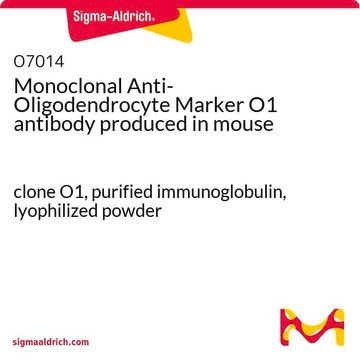Fontos dokumentumok
O7139
Monoclonal Anti-Oligodendrocyte Marker O4 antibody produced in mouse
clone O4, purified immunoglobulin, lyophilized powder
Szinonimák:
Oligodendrocyte Marker O4 Antibody
About This Item
ICC
immunocytochemistry: 1-10 μg/mL
Javasolt termékek
biológiai forrás
mouse
Minőségi szint
konjugátum
unconjugated
antitest forma
purified immunoglobulin
antitest terméktípus
primary antibodies
klón
O4, monoclonal
Forma
lyophilized powder
faj reaktivitás
mouse, rat, chicken, human
technika/technikák
flow cytometry: 0.25 μg/106 cells (rate differentiated cortical stem cells)
immunocytochemistry: 1-10 μg/mL
izotípus
IgM
kiszállítva
wet ice
tárolási hőmérséklet
−20°C
célzott transzláció utáni módosítás
unmodified
Géninformáció
human ... OMG(4974)
Általános leírás
Immunogén
Alkalmazás
Biokémiai/fiziológiai hatások
Fizikai forma
Jogi nyilatkozat
Nem találja a megfelelő terméket?
Próbálja ki a Termékválasztó eszköz. eszközt
kapcsolódó termék
Tárolási osztály kódja
11 - Combustible Solids
WGK
WGK 1
Lobbanási pont (F)
Not applicable
Lobbanási pont (C)
Not applicable
Egyéni védőeszköz
Eyeshields, Gloves, type N95 (US)
Válasszon a legfrissebb verziók közül:
Analitikai tanúsítványok (COA)
Nem találja a megfelelő verziót?
Ha egy adott verzióra van szüksége, a tétel- vagy cikkszám alapján rákereshet egy adott tanúsítványra.
Már rendelkezik ezzel a termékkel?
Az Ön által nemrégiben megvásárolt termékekre vonatkozó dokumentumokat a Dokumentumtárban találja.
Az ügyfelek ezeket is megtekintették
Tudóscsoportunk valamennyi kutatási területen rendelkezik tapasztalattal, beleértve az élettudományt, az anyagtudományt, a kémiai szintézist, a kromatográfiát, az analitikát és még sok más területet.
Lépjen kapcsolatba a szaktanácsadással









